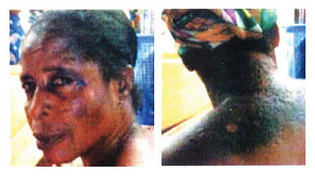Chemical hair relaxers use in African American women
Neither the Environmental Protection Agency (EPA), nor the Department of Health and Human Services (DHHS), nor the International Agency for Research on Cancer (IARC) characterize lye as a cancer causer. Yet a web page of the Agency for Toxic Substances and Disease Registry (ATSDR), a branch of DHHS, acknowledges “reports of cancer of the esophagus 15 to 40 years (after exposure), caused by corrosion induced by sodium hydroxide.” These malignancies, it says, “were most likely the result of tissue destruction and scar formation rather than a direct carcinogenic action of sodium hydroxide itself.”
Though the study does not detail the circumstances of exposure to lye, it implies inhalation was a factor. “Off gassing of these products is dangerous,” says Leeann Brown, spokesperson for the Environmental Working Group, a consumer advocacy organization. “It’s not just a matter of direct application, but people sitting in well ventilated salons inhale fumes from relaxer chemicals.”
Saving the Worst for the Youngest
Yet children’s relaxers can be more caustic than ones made for adults, according the Skin Deep Cosmetic Safety Database, a web site created by the Environmental Working Group that ranks brands according to perceived health risks. The site assigns numbers one through ten to personal care products to indicate the level of hazard based on the chemicals contained and how the preparations will be used. Africa’s Best Kid’s Organics No-Lye Organic Conditioning Relaxer System with ScalpGuard receives a “10” for toxicity.
Leeann Brown, spokesperson for the EWG, says it’s not safe to apply any brand of chemical straightener to the head of a child.. “If straightening is started at a young age and done throughout life, it all adds up.”
Not all juvenile encounters with relaxers are cosmetic, though. Those are the ones that require a trip to the emergency room. “Ingestion of hair relaxer (by toddlers) has become increasingly common,” say the authors of a paper, written in the 90s, about children admitted for poisoning and mouth burns at Rainbow Babies and Children’s Hospital in Cleveland, Ohio.
People underestimate the vulnerability of skin, says Andrew Ternay, University of Denver chemistry professor and author of The Language of Nightmares, a book about the use of chemicals in terrorism. “It is a living organ, not just an inert piece of something. There are materials capable of doing substantial damage to (your body) through it.”
Blame it on Rio…
But in 1995 the FDA did swoop down and confiscate two brands of relaxers. Consumers complained that Brazilian imports Rio Hair Naturalizer System and Rio Hair Naturalizer System with Color Enhancer not only caused burning, itching, and hair loss, it could turn hair green. Reportedly by 2004, up to nearly 2 million dollars worth of the product was destroyed, and it was taken off the market.
The effects the banned product created when it tried to “enhance” color may have been dramatic, but the combination of dye and straightening chemicals might do even worse damage than making your head look like Astroturf, Dr. Ternay says. Though beauticians traditionally recommend a two-week lag time between perm and dye applications to avoid hair breakage, a few newer products claim dye can be applied directly following a relaxer. “That’s scary,” he says. Procedures like washing and perming “sensitize” the scalp and makes it more absorbent, he says. “I’d be loath to have somebody treating my wife’s head with any sort of perm and then treating it with dye.”
Conditioners: Killing You Softly…
But what usually follows a perm is a conditioner, and they are healthy and good for you and your hair, right? After all they have words in their names calling to mind life-saving procedures: “Therapy,” “emergency,” “renewal.” And of course there is the ever-popular “herbal” and “organic.”
Dr. Rosenberg, of Boston University, has concerns about conditioners. “Women who used products advertised as having animal placenta were shown to have a higher rate of breast cancer,” she says. Those brands contained hormones.
“Hormones are more easily absorbed into the skin,” Strachan says. She adds, though, that the skin on our heads is dense, causing decreased vulnerability to certain substances.
Estrogenic preparations are more likely aimed at African-American women, Malkan warns. They are marketed as remedies for “dry and damaged hair,” harmed from perms and other procedures.
http://www.thedefendersonline.com/2...acts-might-not-be-so-relaxing/comment-page-1/
My heart just aches for these women who do this to themselves and thier children in the civilized and advanced country that is the USA.
Neither the Environmental Protection Agency (EPA), nor the Department of Health and Human Services (DHHS), nor the International Agency for Research on Cancer (IARC) characterize lye as a cancer causer. Yet a web page of the Agency for Toxic Substances and Disease Registry (ATSDR), a branch of DHHS, acknowledges “reports of cancer of the esophagus 15 to 40 years (after exposure), caused by corrosion induced by sodium hydroxide.” These malignancies, it says, “were most likely the result of tissue destruction and scar formation rather than a direct carcinogenic action of sodium hydroxide itself.”
Though the study does not detail the circumstances of exposure to lye, it implies inhalation was a factor. “Off gassing of these products is dangerous,” says Leeann Brown, spokesperson for the Environmental Working Group, a consumer advocacy organization. “It’s not just a matter of direct application, but people sitting in well ventilated salons inhale fumes from relaxer chemicals.”
Saving the Worst for the Youngest
Yet children’s relaxers can be more caustic than ones made for adults, according the Skin Deep Cosmetic Safety Database, a web site created by the Environmental Working Group that ranks brands according to perceived health risks. The site assigns numbers one through ten to personal care products to indicate the level of hazard based on the chemicals contained and how the preparations will be used. Africa’s Best Kid’s Organics No-Lye Organic Conditioning Relaxer System with ScalpGuard receives a “10” for toxicity.
Leeann Brown, spokesperson for the EWG, says it’s not safe to apply any brand of chemical straightener to the head of a child.. “If straightening is started at a young age and done throughout life, it all adds up.”
Not all juvenile encounters with relaxers are cosmetic, though. Those are the ones that require a trip to the emergency room. “Ingestion of hair relaxer (by toddlers) has become increasingly common,” say the authors of a paper, written in the 90s, about children admitted for poisoning and mouth burns at Rainbow Babies and Children’s Hospital in Cleveland, Ohio.
People underestimate the vulnerability of skin, says Andrew Ternay, University of Denver chemistry professor and author of The Language of Nightmares, a book about the use of chemicals in terrorism. “It is a living organ, not just an inert piece of something. There are materials capable of doing substantial damage to (your body) through it.”
Blame it on Rio…
But in 1995 the FDA did swoop down and confiscate two brands of relaxers. Consumers complained that Brazilian imports Rio Hair Naturalizer System and Rio Hair Naturalizer System with Color Enhancer not only caused burning, itching, and hair loss, it could turn hair green. Reportedly by 2004, up to nearly 2 million dollars worth of the product was destroyed, and it was taken off the market.
The effects the banned product created when it tried to “enhance” color may have been dramatic, but the combination of dye and straightening chemicals might do even worse damage than making your head look like Astroturf, Dr. Ternay says. Though beauticians traditionally recommend a two-week lag time between perm and dye applications to avoid hair breakage, a few newer products claim dye can be applied directly following a relaxer. “That’s scary,” he says. Procedures like washing and perming “sensitize” the scalp and makes it more absorbent, he says. “I’d be loath to have somebody treating my wife’s head with any sort of perm and then treating it with dye.”
Conditioners: Killing You Softly…
But what usually follows a perm is a conditioner, and they are healthy and good for you and your hair, right? After all they have words in their names calling to mind life-saving procedures: “Therapy,” “emergency,” “renewal.” And of course there is the ever-popular “herbal” and “organic.”
Dr. Rosenberg, of Boston University, has concerns about conditioners. “Women who used products advertised as having animal placenta were shown to have a higher rate of breast cancer,” she says. Those brands contained hormones.
“Hormones are more easily absorbed into the skin,” Strachan says. She adds, though, that the skin on our heads is dense, causing decreased vulnerability to certain substances.
Estrogenic preparations are more likely aimed at African-American women, Malkan warns. They are marketed as remedies for “dry and damaged hair,” harmed from perms and other procedures.
http://www.thedefendersonline.com/2...acts-might-not-be-so-relaxing/comment-page-1/
My heart just aches for these women who do this to themselves and thier children in the civilized and advanced country that is the USA.






